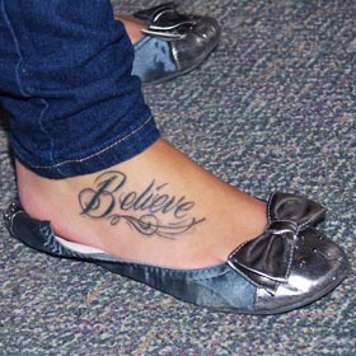
Some people might wonder if it is ok to get a tattoo or a piercing after a transplant.
Tattoos and piercings require a break in the skin and a tattoo introduces a foreign material into your body. Because of this, both carry a risk of infection. You will want to avoid this because the anti-rejection medications you take after your transplant already make your immune system weaker and less able to fight infections. This is why your transplant team might be a bit nervous about you getting a tattoo or piercing!
Different families have different rules about piercing and tattoos. Talk to your parents before you make any decision.
If you are determined to get one, here are some ways you can keep yourself as safe as possible.
- Make a plan in advance. Drunken tattoos are so not a good idea! Neither is having your best friend do a tattoo or piercing for you.
- Check out different places that do tattoos or piercings. Ask about how each one controls infections and don’t take “we keep everything really clean” for an answer. A safe and reputable tattoo or piercing studio uses: disposable, sterile needles that are wrapped individually for single use; tattoo dye in single use bottles – not left-over dye from larger bottles; piercing guns instead of needles and a special machine, called an autoclave, to sterilize equipment.
- If you have one studio in mind, ask around to make sure it has a good reputation. If you hear a lot of young people telling you about a place where you can get a tattoo while underage and without your parents’ consent, stay away – the studio is probably breaking lots of other rules too!
- Certain parts of your body should not be pierced either because it is too easy for an infection to make its way to your brain or because those parts often have more germs.
- Eyebrows are a bad place, for example – lots of bacteria can hang out there and your brows are close to the nerve and blood vessel pathways linking your eyes to your brain.
- Mouth piercings – on your tongue or in your cheek – should also be avoided. These put jewellery into contact with your teeth or gums, which could damage them or cause infections.
- Bottom line: other than your earlobes, we recommend against facial piercings or tattoos.
- Don’t get a tattoo or piercing while you are on high levels of anti-rejection medications, for example in the first six months after your transplant or after a rejection episode.
- If you tend to get bored with things quickly, stay away from tattoos, as they are difficult and expensive to remove (and removing them doesn’t always work). Piercings heal up more quickly.
- Always follow after-care instructions! If you are someone who tends to forget your medications or other treatments, then only consider a tattoo or piercing that doesn’t take a long time to heal. Earlobes heal faster than belly buttons, for instance.
- Clean any jewellery with alcohol before you use it in a fairly new piercing.
- If you see a sign of infection, contact your transplant team.






